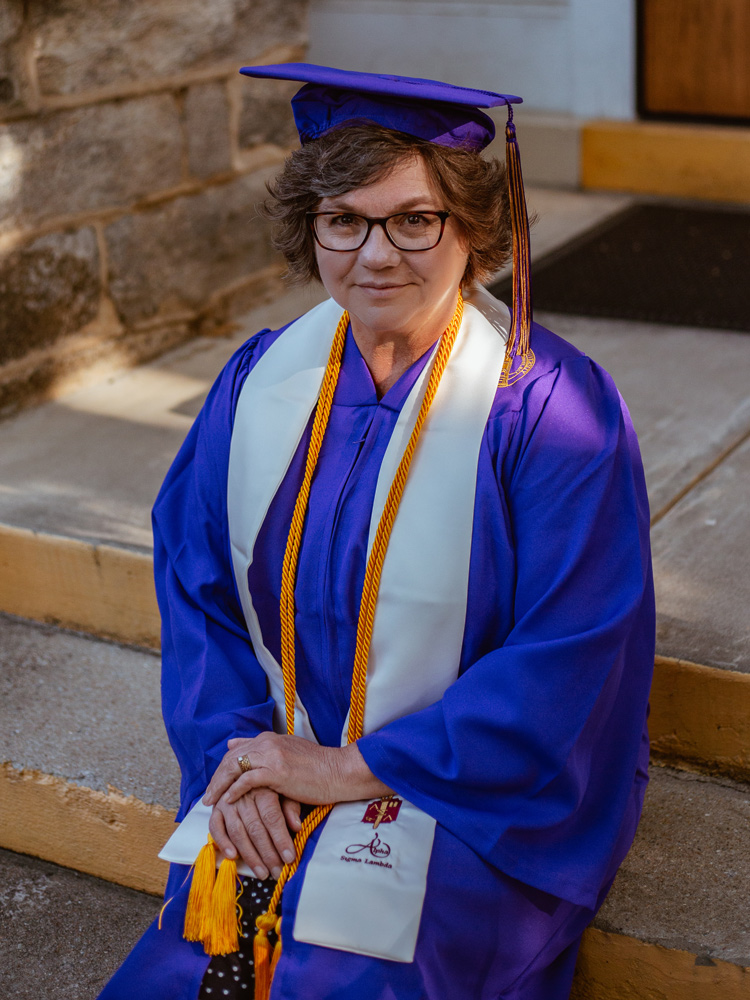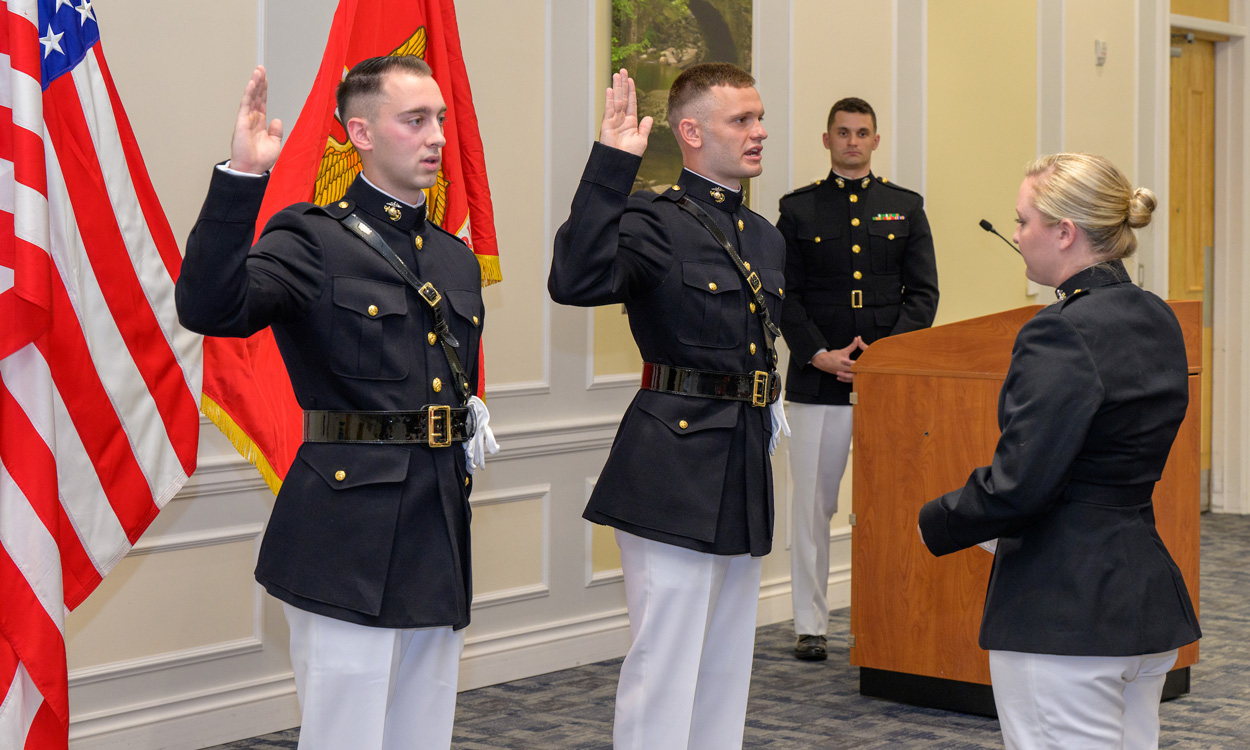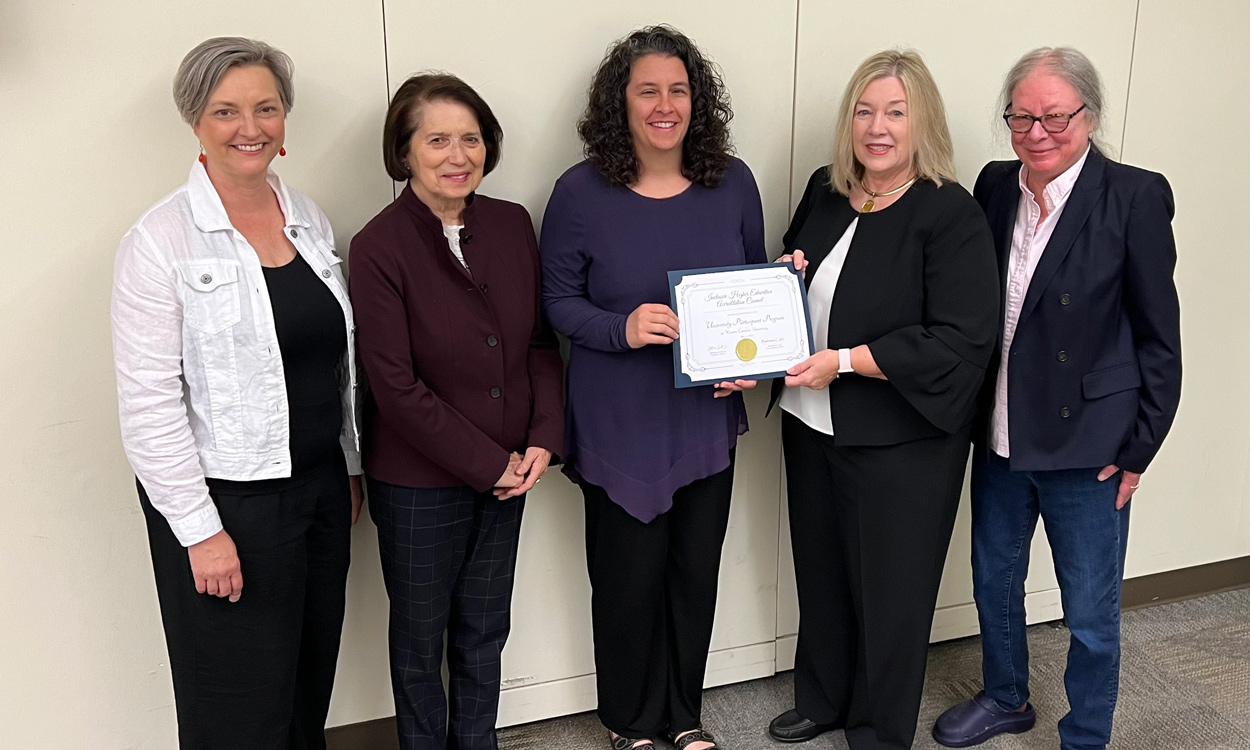Sherry Fowler graduates from the B-K Program as a non-traditional, first-generation student
By Brooklyn Brown
Sherry Fowler is a non-traditional, first-generation college student who will receive her bachelor’s degree in the birth-to-kindergarten education program this weekend at Western Carolina University’s 2023 Spring Commencement. Fowler is a 61-year-old Head Start and North Carolina pre-k teacher in Hendersonville.
Fowler took her first college class in 1985. She postponed her education to support her family.
“My husband was in the Air Force, I was in my early 20s, and at that time we had two children under two. I was going to school during the day and he was going at night,” she said. “Something had to give and he was gonna make a lot more money than me. So, I decided that I would step back and let him finish first.”
Fowler continued to take a few classes here and there while working and raising four children with her husband of 43 years. In 2016, she decided to complete her associate’s degree.
“All those years, I had been taking prerequisites to apply to nursing school somewhere. It was time to finish it; fish or cut bait,” she said. “I earned my associate’s in 2017, and then got one of the coveted seats in nursing school. I walked in on the very first day and realized I had zero desire to be a nurse. I looked around at all the women that were in the room with me and I thought ‘There are single mothers who have been waiting for a seat in this program for three years. They have kids to feed and my kids are grown and I don't have any desire to be here.’ I gave up the slot.”
After stepping away from the nursing program, Fowler started working for a Head Start agency in Asheville who offered to pay her tuition without any expectation of added service if she completed her bachelor’s in the WCU b-k education program and earned her b-k teaching license. At first, Fowler was hesitant.
“One of my coworkers asked why I was hesitating and I said ‘Well, I’ll be 61 when I graduate. She said ‘You’re gonna be 61 in two years whether you go to school or not. Isn’t it way past time that your credentials match your experience?”

Sherry Fowler
Fowler took her co-worker’s advice and began the b-k program, which is completely online to accommodate working teachers.
“I would never have been able to do this if it had not been a distance program that was available completely online,” Fowler said. “Even though it's online, the instruction is just as personal. I have had some of the best instruction I’ve ever had in my life and I’ve gone to college in four different states.”
Fowler also credits her adviser, Greg McLamb, who is an academic advisor for birth-to kindergarten and social sciences education in the College of Education and Allied Professions' student success center
“He has been a constant support for me,” Fowler said. “He talked me off the ledge when I was worried about taking the edTPA. I was afraid of not passing, but I made a 42 on the first try, which is one of the highest scores. He was never impatient and he always made time.”
Fowler’s success in the b-k program is due, in part, to her years of experience working with children. Fowler is particularly passionate about helping children who live in poverty and/or marginalized communities.
“I have worked in preschools and child care centers that were very expensive and catered to quite a wealthy clientele, and I hated it,” Fowler said. “I always wondered at the end of the day if I was doing any good for anybody. When I started working with children with risk factors, I seemed to be able to build a rapport where they knew that we have an affinity for each other and we understand each other.”
Fowler’s family history has influenced her compassion for the poverty stricken and marginalized. “I have four kids. One of my kids is special needs and one of my grandchildren is special needs,” she said. “My mother and father also come from extremely poor backgrounds. Just hearing about their childhood and their early years, I can see what they accomplished because somebody took an interest in them. Both of my parents were the youngest of depression-era families, and both of them are the first in their families to earn a high school diploma. I am a first-generation university graduate at 61.
“I am honored to be the wife, daughter, sister, aunt, niece and cousin of veterans of four branches of the United States military. And that is not because we are some storied military tradition; it's because I come from people who were poor and they all looked for a way to lift themselves up out of poverty.”
Fowler’s mother in particular inspired her interest in education. “If I could change one thing about my life, I wish my mother was here to see me graduate,” she said. “She was born in this tiny little coal mining community way up in the mountains of Virginia. When she was about five, the book mobile started coming to her little town. She borrowed and read books from the book mobile and she learned to dream for things that she didn't even know about to dream for. That also has been a big influence on me wanting to work with children who were born into difficult circumstances.”
Fowler often works with families of color, especially children of migrant workers. “I try to make it clear from the first time I meet with the families that I want to build a bridge between us and they’ve all met me in the middle. I’ve never had a family that I just couldn’t work with because we couldn’t overcome the issues of race,” Fowler said. “I’ve been fortunate in that and I’ve also worked really hard at it in taking any education I could put my hands on and talking to people that I worked with successfully and saying what do I need to do for you because I know that I don’t know.”
Fowler appreciates the b-k program for incorporating lessons on cultural sensitivity and trauma informed instruction in early childhood classrooms. “We did a lot of work on cultural diversity and cultural sensitivity and constructing those intercultural bridges to be sensitive to and have respect for other cultures,” she said. “We also learned a lot about trauma informed education work and teaching children who have experienced trauma.”
In her last year in the program, the agency paying for her tuition decided to put a restriction on her tuition assistance that required a contract for a duration of service after graduation.
“I applied for a scholarship and I didn’t have any inkling that I would get one because you don’t give scholarships to people like me, those go to the 19 year olds,” she said. “Well, apparently you do, because I received the Mabel Augusta Morgan Brandon scholarship and that paid for my last year of tuition. I did not borrow any money, I don’t owe anybody any service and I’m absolutely square.”
Fowler will graduate this weekend as an example of what it means to be a Catamount. “Everyone in my program always felt from day one that we were very much a part of the college and that Western was proud to have us,” she said.

